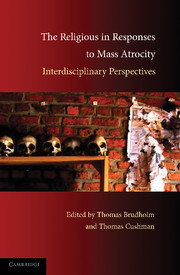Book contents
- Frontmatter
- Contents
- List of Contributors
- Acknowledgments
- Introduction: The Religious in Responses to Mass Atrocity
- Part I Between Necessity and Impossibility: The Role of Religion in the Face of Atrocity
- Part II Does It Help to Import Religious Ideas: Reflections on Punishment, War, and Forgiveness
- 4 Can We Punish the Perpetrators of Atrocities?
- 5 The Ethics of Forgiveness and the Doctrine of Just War: A Religious View of Righting Atrocious Wrongs
- 6 On the Advocacy of Forgiveness after Mass Atrocities
- Part III Sociologies of the Religious in Responses to Mass Atrocities
- Index
4 - Can We Punish the Perpetrators of Atrocities?
Published online by Cambridge University Press: 01 September 2009
- Frontmatter
- Contents
- List of Contributors
- Acknowledgments
- Introduction: The Religious in Responses to Mass Atrocity
- Part I Between Necessity and Impossibility: The Role of Religion in the Face of Atrocity
- Part II Does It Help to Import Religious Ideas: Reflections on Punishment, War, and Forgiveness
- 4 Can We Punish the Perpetrators of Atrocities?
- 5 The Ethics of Forgiveness and the Doctrine of Just War: A Religious View of Righting Atrocious Wrongs
- 6 On the Advocacy of Forgiveness after Mass Atrocities
- Part III Sociologies of the Religious in Responses to Mass Atrocities
- Index
Summary
As [a pirate] has renounced all the benefits of society and government, and has reduced himself afresh to the savage state of nature, by declaring war against all mankind, all mankind must declare war against him.
These are deeds that demand not only condemnation, but damnation in the full religious meaning of the word – that is, the doer not only puts himself outside the community of men; he also separates himself in a final way from a moral order that transcends the human community.
[Some] may say that even such people are owed unconditional respect, meaning, not that they are deserving of esteem, but that they are owed a kind of respect which is not conditional upon what they have done and which cannot be forfeited. Some will say that even the most terrible evil-doers are owed this respect as human beings and that we owe it to them because we are human beings.
The question that forms the title of this chapter invites an obvious and simple answer – an answer which is also true, in a formal sense. Of course we can punish them: if they can be captured and their guilt duly proved, they can be subjected to the institutional process of a criminal trial; they can be formally convicted; the court can formally sentence them to imprisonment or even death; pursuant to that sentence, they can be locked in a prison, or killed through the formal process by which death penalties are carried out. […]
- Type
- Chapter
- Information
- The Religious in Responses to Mass AtrocityInterdisciplinary Perspectives, pp. 79 - 104Publisher: Cambridge University PressPrint publication year: 2009
- 10
- Cited by



